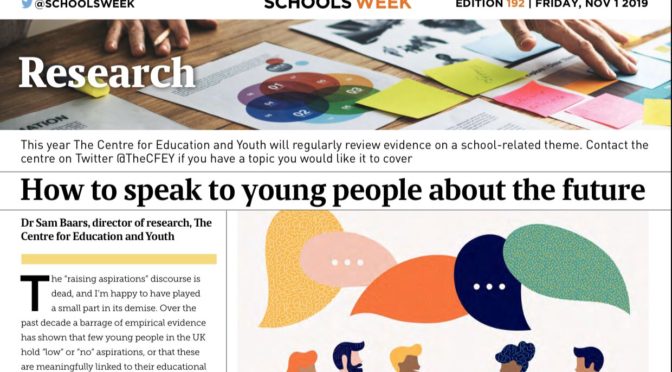Over the next year, The Centre for Education and Youth are writing a series of short research reviews for Schools Week, addressing school-related themes. I’ve kicked things off today by revisiting my old pet topic – aspirations. I’ve put together a short review of the latest research on ‘aspiration-raising’, and how we can have better conversations with young people about their futures.
This piece originally appeared in Schools Week.
The ‘raising aspirations’ discourse is dead, and I’m happy to have played a small part in its demise.
Over the last decade, a barrage of empirical evidence has shown that few young people in the UK hold ‘low’ or ‘no’ aspirations, or that these are meaningfully linked to their educational attainment and wider outcomes. Seeing aspiration-raising as a panacea for poor grades has been discredited by the EEF, while academics have roundly condemned the whole discourse as a red herring.
It’s one thing to slay an unhelpful way of thinking, but arguably the harder job is to construct something in its place. Given a blank slate, how does the latest research suggest schools should approach their conversations with pupils about their future hopes and plans?
Firstly, focus on the journey rather than the destination. At The Centre for Education and Youth we were part of early attempts to encourage practitioners and parents to focus on helping young people put plans in place to achieve their (mainly already-high) aspirations, rather than focus on the supposedly ‘low’ aspirations themselves.
Young people often have a fairly clear idea of their desired endpoint; what they’re often less clear about is how to get there – and research suggests this is particularly the case for disadvantaged pupils. Even if you are keen on inculcating a particular aspiration, such as university, you’re better off focusing on the steps rather than the outcome. That’s because potential aspirations can be suppressed when young people don’t feel they know how to realise them. Making that pathway clearer can help to make the aspiration ‘thinkable’ in the first place.
Secondly, distinguish between aspirations and expectations. My own research called for a clearer separation between young people’s aspirations (what they want to happen in future) and their expectations (what they think is likely to happen in future). The importance of this distinction has been demonstrated by excellent empirical studies which show that it’s the combination of aspirations and expectations that seems to feed into better attainment at school, and a greater likelihood of applying to university. If young people have high aspirations but don’t expect them to be remotely attainable, it’s not hard to see how those aspirations rapidly wither on the vine.
Thirdly, take the time to gauge whether young people feel they have much influence over their own future. This can be considered in relation to specific goals (their ‘self-efficacy’) and also their overall belief that what they do as an individual has any bearing on how their story will unfold more widely (their ‘locus of control’).
Taken together, we can see these as a ‘set’ of factors that feed into how young people construct what researchers call ‘possible selves’. Initial experimental studies indicate that working with young people to develop their possible selves appears to have a significant impact on young people’s school motivation and educational outcomes.
There are difficult, and sometimes openly negative aspects to the conversations you might have with young people about their possible selves. Firstly, because exploring possible selves goes beyond talking narrowly about aspirations, you’ll also find yourself talking about things that young people don’t want to do, don’t see as possible, or don’t know how to reach. Secondly, for such seemingly personal, individualised conversations, young people’s backgrounds are never far from the frame. Socioeconomic status, ethnicity, and gender all shape the types of ideas that young people consider as potentially possible or desirable, their sense of agency, and their ability to access the information needed to start mapping out pathways.
Talking to young people about the future is central to knowing and supporting them. But we can do so much better than just talking about their aspirations. Recent research suggests talking instead about possible selves could pave the way for much more meaningful dialogue and support. This approach has clear relevance for careers education and widening participation, but also for anyone looking for ways of supporting young people’s educational engagement and attainment.
